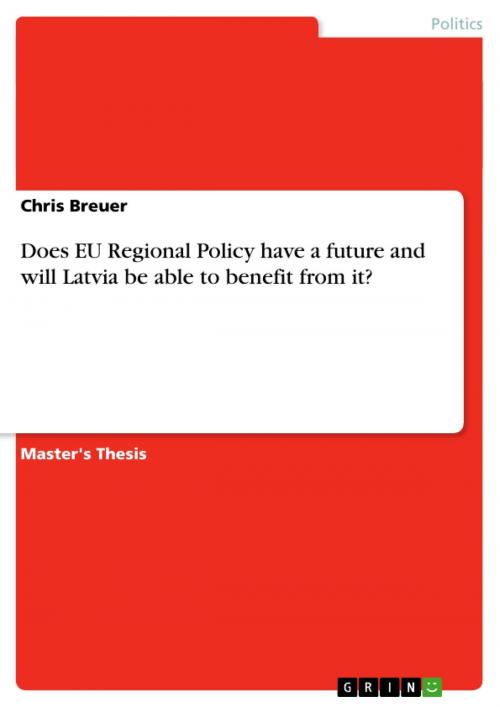Does EU Regional Policy have a future and will Latvia be able to benefit from it?
Nonfiction, Social & Cultural Studies, Political Science| Author: | Chris Breuer | ISBN: | 9783638332453 |
| Publisher: | GRIN Publishing | Publication: | December 15, 2004 |
| Imprint: | GRIN Publishing | Language: | English |
| Author: | Chris Breuer |
| ISBN: | 9783638332453 |
| Publisher: | GRIN Publishing |
| Publication: | December 15, 2004 |
| Imprint: | GRIN Publishing |
| Language: | English |
Master's Thesis from the year 2004 in the subject Politics - International Politics - Topic: European Union, grade: 2,0 (B), University of Münster (48), language: English, abstract: In this thesis I took a closer look at the second largest and most flexible policy field of the EU: Regional Policy. At present, there are debates about the future of EU Regional Policy, closely linked to the current debate about the EU budget for the planning period 2007-2013 for it is this budget that sets the boundaries for the financial resources of EU Regional Policy. I assume that the future of the EU, its acceptance within the community and its legitimacy by the community, is dependent on the outcome of this ongoing debates and the future of regional policy. By analysing the developments and the ongoing debates concerning EU Regional Policy so far I give prospects for the future of the EU in general and EU Regional Policy in particular. The eastern enlargement is highly influencing regional policy and will result in a financial shift from west to east. I used Latvia as a case study to show in what way concrete structures of a post-Soviet state are being influenced and developed. In order to investigate and do the appropriate research concerning my case study I lived in Riga, the capital and political Walhalla of Latvia, for half a year. By being there and participating in seminars and congresses and by carrying out a project with a main focus to bridge the information gap between local Latvian authorities and the EU, I got a good overview how the different governmental officials, but the 'normal people' as well, judge the EU and EU Regional Policy in particular. I learned that regional policy is extremely subject to the spectators view. The judgement of EU Regional Policy depends on different political, social and moral argumentations. That the angle on how to look at the topic is very different seems obvious: Let's take a Latvian mayor who is also part-time farmer as an example: Although he is interested in EU support he is barely able to fulfil the administrative and material conditions necessary to be eligible for EU support. His Dutch colleague on the other hand is concerned about the financing of his relatively efficient local administration and he might judge financial support to weaker EU regions as competition. This example shows the different starting points. The decision-making process shows similar disparities. At the moment there is a clear gap between net-contributors and net-beneficiaries within the Union. They have not come to a compromise concerning EU Regional Policy and the budget yet. ...
Master's Thesis from the year 2004 in the subject Politics - International Politics - Topic: European Union, grade: 2,0 (B), University of Münster (48), language: English, abstract: In this thesis I took a closer look at the second largest and most flexible policy field of the EU: Regional Policy. At present, there are debates about the future of EU Regional Policy, closely linked to the current debate about the EU budget for the planning period 2007-2013 for it is this budget that sets the boundaries for the financial resources of EU Regional Policy. I assume that the future of the EU, its acceptance within the community and its legitimacy by the community, is dependent on the outcome of this ongoing debates and the future of regional policy. By analysing the developments and the ongoing debates concerning EU Regional Policy so far I give prospects for the future of the EU in general and EU Regional Policy in particular. The eastern enlargement is highly influencing regional policy and will result in a financial shift from west to east. I used Latvia as a case study to show in what way concrete structures of a post-Soviet state are being influenced and developed. In order to investigate and do the appropriate research concerning my case study I lived in Riga, the capital and political Walhalla of Latvia, for half a year. By being there and participating in seminars and congresses and by carrying out a project with a main focus to bridge the information gap between local Latvian authorities and the EU, I got a good overview how the different governmental officials, but the 'normal people' as well, judge the EU and EU Regional Policy in particular. I learned that regional policy is extremely subject to the spectators view. The judgement of EU Regional Policy depends on different political, social and moral argumentations. That the angle on how to look at the topic is very different seems obvious: Let's take a Latvian mayor who is also part-time farmer as an example: Although he is interested in EU support he is barely able to fulfil the administrative and material conditions necessary to be eligible for EU support. His Dutch colleague on the other hand is concerned about the financing of his relatively efficient local administration and he might judge financial support to weaker EU regions as competition. This example shows the different starting points. The decision-making process shows similar disparities. At the moment there is a clear gap between net-contributors and net-beneficiaries within the Union. They have not come to a compromise concerning EU Regional Policy and the budget yet. ...















